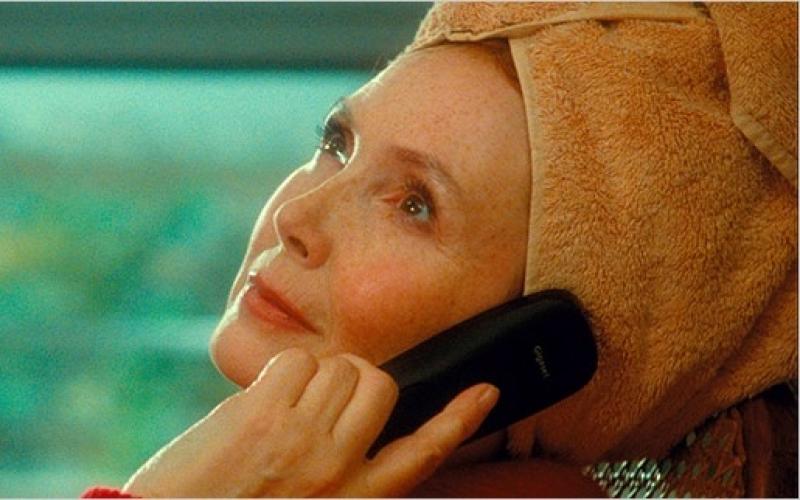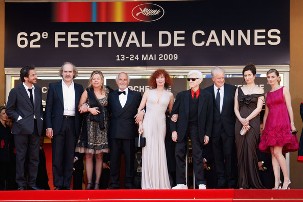Wild Grass | reviews, news & interviews
Wild Grass
Wild Grass
Alain Resnais is still going at nearly 90. But what does it all mean?

It’s an odd enough statistic that only four of Alan Ayckbourn’s plays have been made into films. Odder still that, of those, three are the work of Alain Resnais, the grand old man of the nouvelle vague. Yes, it was a curious moment when the director of Last Year in Marienbad got into bed with the author of Bedroom Farce.
Last year Wild Grass – Les Herbes Folles, to use its French title – was shown at Cannes (Resnais and the cast pictured below right), where no one could quite bring themselves to give the film itself an award, but Resnais was the deserving recipient of a lifetime achievement gong. The film’s narrative is taken – almost word for word, at some points – from a book called L’Incident by Christian Gailly. If you’ve read much contemporary French fiction you’ll not be astonished to hear that you have to sift through much impressionistic flummery to get to the eponymous incident. Maddening opacity and unfettered navel-gazing are the dish of the day.
 The set-up, such as it is, is that a middle-aged woman has her bag snatched. A man finds her purse and returns it via the police. This all takes about half an hour, as Resnais explores a new novelistic way of transferring character and motive from the page to the screen. In practice, that means an awful lot of voiceover. It puts you in mind of the many other films celebrated for keeping plates spinning through a daredevil opening – Touch of Evil (the long uncut shot), Once Upon a Time in the West (no dialogue for 15 minutes), Saving Private Ryan (a lot of bullets for 20 exhausting minutes). Resnais dares to have his male lead simply read out the novel he may or may not be working on for what feels like forever. It was like Granada’s Brideshead Revisited, without the sex, or the snobbery, or the exteriors, or any of the sweet sorrow.
The set-up, such as it is, is that a middle-aged woman has her bag snatched. A man finds her purse and returns it via the police. This all takes about half an hour, as Resnais explores a new novelistic way of transferring character and motive from the page to the screen. In practice, that means an awful lot of voiceover. It puts you in mind of the many other films celebrated for keeping plates spinning through a daredevil opening – Touch of Evil (the long uncut shot), Once Upon a Time in the West (no dialogue for 15 minutes), Saving Private Ryan (a lot of bullets for 20 exhausting minutes). Resnais dares to have his male lead simply read out the novel he may or may not be working on for what feels like forever. It was like Granada’s Brideshead Revisited, without the sex, or the snobbery, or the exteriors, or any of the sweet sorrow.
This being France, a fantastical relationship sprouts from the random connection offered by the purse. The woman’s papers reveal that she has a private pilot’s licence. Of course she has. Which mysterious French heroine wouldn’t? (However she doesn’t, from the evidence of her electric red fright hair, own a comb.) From this unpromising topsoil a dilemma sprouts. Should the writer call directly to return the purse? No. Yes. No. Should he leave his name with the police? Yes. No. Yes. Then when she thanks him by phone for returning her purse, can he, might he, should he continue contact? Please!
The French have a gift for agonising over such decisions. The woman, Marguerite, is played by Resnais’s wife and muse Sabine Azéma, while André Dussollier plays her admirer Georges. At one point a policeman (played by Mathieu Amalric from The Diving Bell and the Butterfly) supposes he is around 50. Is this a function of the film's delusions or vanity? Because Dussollier has got to be well north of 60, and looks more. Such questions are ceaselessly posed, almost invariably unanswered.
In due course, Marguerite, who is also a dentist, decides to court her stalker only after he has slashed her tyres. (Nothing so exciting as this happens on screen, of course. Nor, by the way, are we permitted to witness the climactic resolving incident.) The need for a married man to commune with a mysterious female stranger without the wife batting an eyelid is of course one of the baffling things about France. Our nearest neighbours and oldest enemies, with their opaque motivations and maddening parade of self-absorption, really are the most perfect strangers. It’s little wonder that story-driven British fiction is so vastly popular in France (much more than French fiction is here), and why Alain Resnais came knocking on Alan Ayckbourn’s rationalist door. Crossing the Channel is the only way they can slake a thirst for what in psychotherapy they call concrete thinking.
Watch the Wild Grass trailer
Share this article
The future of Arts Journalism
You can stop theartsdesk.com closing!
We urgently need financing to survive. Our fundraising drive has thus far raised £49,000 but we need to reach £100,000 or we will be forced to close. Please contribute here: https://gofund.me/c3f6033d
And if you can forward this information to anyone who might assist, we’d be grateful.

Subscribe to theartsdesk.com
Thank you for continuing to read our work on theartsdesk.com. For unlimited access to every article in its entirety, including our archive of more than 15,000 pieces, we're asking for £5 per month or £40 per year. We feel it's a very good deal, and hope you do too.
To take a subscription now simply click here.
And if you're looking for that extra gift for a friend or family member, why not treat them to a theartsdesk.com gift subscription?
more Film
 Bugonia review - Yorgos Lanthimos on aliens, bees and conspiracy theories
Emma Stone and Jesse Plemons excel in a marvellously deranged black comedy
Bugonia review - Yorgos Lanthimos on aliens, bees and conspiracy theories
Emma Stone and Jesse Plemons excel in a marvellously deranged black comedy
 theartsdesk Q&A: director Kelly Reichardt on 'The Mastermind' and reliving the 1970s
The independent filmmaker discusses her intimate heist movie
theartsdesk Q&A: director Kelly Reichardt on 'The Mastermind' and reliving the 1970s
The independent filmmaker discusses her intimate heist movie
 Blu-ray: Wendy and Lucy
Down-and-out in rural Oregon: Kelly Reichardt's third feature packs a huge punch
Blu-ray: Wendy and Lucy
Down-and-out in rural Oregon: Kelly Reichardt's third feature packs a huge punch
 The Mastermind review - another slim but nourishing slice of Americana from Kelly Reichardt
Josh O'Connor is perfect casting as a cocky middle-class American adrift in the 1970s
The Mastermind review - another slim but nourishing slice of Americana from Kelly Reichardt
Josh O'Connor is perfect casting as a cocky middle-class American adrift in the 1970s
 Springsteen: Deliver Me From Nowhere review - the story of the Boss who isn't boss of his own head
A brooding trip on the Bruce Springsteen highway of hard knocks
Springsteen: Deliver Me From Nowhere review - the story of the Boss who isn't boss of his own head
A brooding trip on the Bruce Springsteen highway of hard knocks
 The Perfect Neighbor, Netflix review - Florida found-footage documentary is a harrowing watch
Sundance winner chronicles a death that should have been prevented
The Perfect Neighbor, Netflix review - Florida found-footage documentary is a harrowing watch
Sundance winner chronicles a death that should have been prevented
 Blu-ray: Le Quai des Brumes
Love twinkles in the gloom of Marcel Carné’s fogbound French poetic realist classic
Blu-ray: Le Quai des Brumes
Love twinkles in the gloom of Marcel Carné’s fogbound French poetic realist classic
 Frankenstein review - the Prometheus of the charnel house
Guillermo del Toro is fitfully inspired, but often lost in long-held ambitions
Frankenstein review - the Prometheus of the charnel house
Guillermo del Toro is fitfully inspired, but often lost in long-held ambitions
 London Film Festival 2025 - a Korean masterclass in black comedy and a Camus classic effectively realised
New films from Park Chan-wook, Gianfranco Rosi, François Ozon, Ildikó Enyedi and more
London Film Festival 2025 - a Korean masterclass in black comedy and a Camus classic effectively realised
New films from Park Chan-wook, Gianfranco Rosi, François Ozon, Ildikó Enyedi and more
 After the Hunt review - muddled #MeToo provocation
Julia Roberts excels despite misfiring drama
After the Hunt review - muddled #MeToo provocation
Julia Roberts excels despite misfiring drama
 London Film Festival 2025 - Bradley Cooper channels John Bishop, the Boss goes to Nebraska, and a French pandemic
... not to mention Kristen Stewart's directing debut and a punchy prison drama
London Film Festival 2025 - Bradley Cooper channels John Bishop, the Boss goes to Nebraska, and a French pandemic
... not to mention Kristen Stewart's directing debut and a punchy prison drama
 Ballad of a Small Player review - Colin Farrell's all in as a gambler down on his luck
Conclave director Edward Berger swaps the Vatican for Asia's sin city
Ballad of a Small Player review - Colin Farrell's all in as a gambler down on his luck
Conclave director Edward Berger swaps the Vatican for Asia's sin city

Add comment